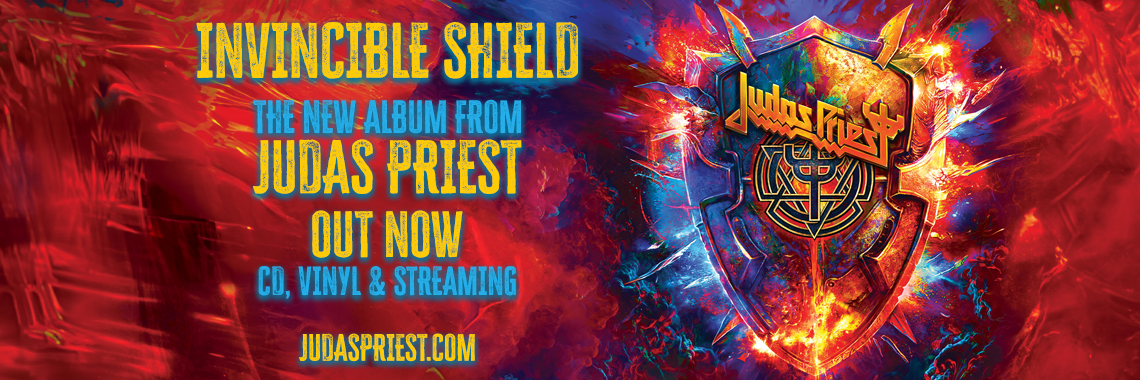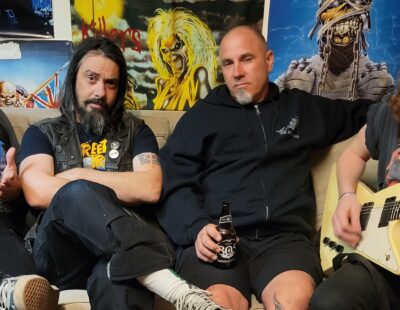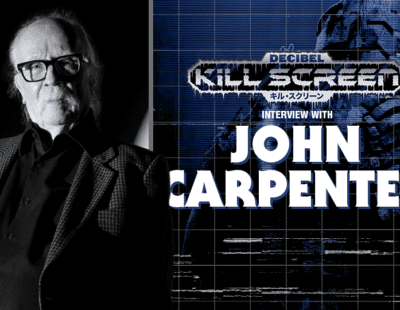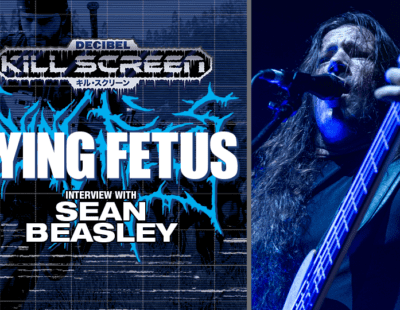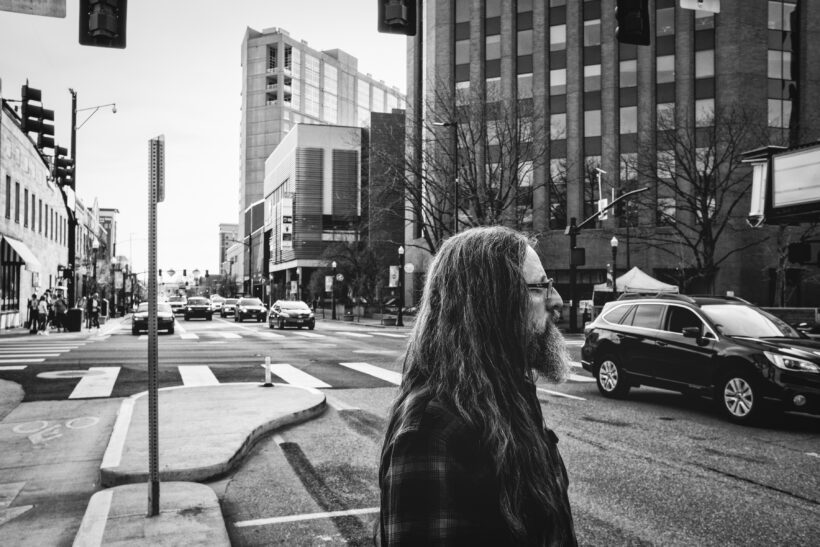
Dark lords of the frayed riff, Yob have become the stuff of legend across 20-plus years in the metal space.
Now, after two decades, the band is set to reissue their debut full length Elaborations of Carbon, a melting pot of influences and genre melding that foreshadowed their epic dominance to come.
The album is being presented for the first time on vinyl (which you can preorder here) as well as being made widely available across streaming services.
The raw, eclectic and unrelentingly heavy tracks on Elaborations of Carbon features Yob founder and beating heart Mike Scheidt (vocals and guitars) alongside Lowell Iles (bass) and Gabe Morley (drums) and was recorded and mixed by Jeff Olsen (a long time collaborator of the band) at Dogwood Recordings in Elmira, Oregon.
Following its initial release in May 2002 on 12th Records, the album (in CD format) would see a small repress in 2013, and has been unavailable since.
With designs on relaunching the album for a new era of fans and diehard Yob faithful, the band enlisted Billy Barnett to make the archival transfer for the 2023 reissue, which was mastered by Matt Colton at Metropolis Music and features completely re-envisioned artwork by Orion Landau.
Decibel proudly sat down with Mike Scheidt for an expansive deep-dive into Yob’s genre bending debut.
Mike, thanks so much for going in the wayback machine for a deep dive into Elaborations of Carbon with us. Has it been kind of cathartic or strange for you to look at this album in the lens of 21 years? It must feel like a lifetime for a musician. You’ve changed so much as an instrumentalist, a songwriter, an artist, as a person. It must be a trip.
Mike: Odd and strange, certainly are fitting descriptors. Maybe a little cathartic. More than anything I’ve had more of an endearing feeling towards the album. I think, as time went on and we continued to grow, I would look back on that record with its warts and pitchiness and various things and kind of disparage it a bit in my mind. Though I look at it now, and one thing that’s very true about it is that we were excited. It was the beginning of us connecting to a wider community.
I think in Eugene, it’s like we were too heavy to be at a rock show, but too rock to be at a metal show. And so we just ended up doing a lot of punk shows and basement shows and playing with various kinds of punk bands. But with Elaborations, it was starting to reach out a little more to some of our other peers and certainly bands that we were heavily influenced by. And so it was very exciting.
And we meant every lick. Warts and all, we meant it. That was where we were at and it was what we were into. And so that kind of excitement, I’ve gotten little windows into what that felt like. Not that I don’t get excited now, but it’s different. It was young and it was fresh and at that time, too, there really was, as far as recording an album, being on a label that’s specifically doing the thing that you do, and being able to connect with a widespread community, that was the payoff. Because there was no other thing you could even hope for. Like where doom and stoner and whatever, the way it sits now in the world, that’s not how it was 20 years ago. Not even remotely close. And that was fine…
We were recording in 2001, and I had four-year-old twins, and a one-year-old. There was no goal other than to make the record and connect with like minded people. That was it. There was no, like, money or touring. I wasn’t in the place to do any of that.
I think it was realistically, probably more around the Metal Blade times or even after, and I think really more than anything is when The Great Cessation came out and just realizing that there was growth available. It was like wow, do we want to grow? Do we want to grow in that way, or do we want to become a touring band? These were questions that started to come and have it be something that it was like shocking to see that there was growth in the community, growth in the audience. And I’m talking about all the bands, not just Yob.
Yob has always been a labor of love. We’ve always felt that this band serves us and it serves whoever it serves. If there’s people who love the music, then it serves them. But it’s not the other way around. You know, the band isn’t the boss. We’re the boss. It’s not like we have to go out and do this or we have to go do that, or we have to post this, or we have to say that. No, no, no, no. We’ve been shooting ourselves in the foot over and over again for 23 years and somehow still seem to be getting rewarded for it.
I love how you said there was no other endgame than the endgame of making this record. Listening through it now with the benefit of your 20 years of hindsight for the entire Yob discography, and this one really does run the gamut. You get Black Sabbath riff vibes in “Clear Seeing”. There’s moments in the beginning of “Asleep in Samsara” that have a Sleep or Electric Wizard feel to it. “All the Children Forgotten” is a fucking terrifying song. It’s such a deep, eclectic, weird, creepy, trippy record and you really feel like you’re getting all portions of things you guys were feeling at the time permeating through, if that makes sense.
Mike: Yeah, I mean, that was it. The very first demo was really straight up Sleep, Electric Wizard worship. I mean, straight up. With Elaborations, I mean, I grew up as a listener with Black Sabbath and was big on punk and metal. And when I say punk or hardcore, it’s like early Corrosion of Conformity and D.R.I. and Poison Idea were all a really big deal. But so was Suffocation and Obituary and Satyricon. I grew up in every stage of metal and was actively paying attention. And I grew up too with Trouble and Candlemass and I didn’t really connect the dots on any of that stuff until probably Cathedral where you get Lee Dorrian and he goes from Napalm Death to Cathedral.
And at the time I just really didn’t get it at all. But Cathedral was very much like a cross genre band in many ways. You know, where Trouble to me was kind of like a little bit throwback or Pentagram II. It was cut from the cloth of their seventies roots, and they were doing a new thing with it. But it wasn’t Cathedral. You know, Cathedral was like oh yeah, it has that, but it also has this deep growl death metal-ish vocals and that lysergic pace. And I think for me with Yob at that time going from the demo to EOC, it was like, okay, I got to start bringing in the other influences. So we’re not going to co-opt our favorite bands.
You know, the first demo, I mean, look, it was the same thing. I had babies and just wanted to write a thing. And I had songs and I grew up playing in bands and I just wanted to get this music out of me. I also paid attention to stonerrock.com and all the bands were happening there, getting turned on to new things and a member of the Cathedral Coven Fan Club. And so they would send out seven inches and cool stuff to check out. And so all those influences started showing where I was like okay, this isn’t going to be straight up stoner, this isn’t going to be straight up doom…
And so EOC I look at as the beginning of our sense of adventure, I guess, where it’s like how can we have everything be there and not have it seem like it’s trying to be ironic or something? And just make actual songs and not have it seem like here’s a Sleep part and here’s Neurosis part and here’s an Electric Wizard part and try to have it somehow be us. And part of that is through the vocals, trying to be adventurous with the vocals too. But that was the beginning of it.
“Pain of I” is maybe one of the heavier songs you’ve ever done. That’s an angry, aggressive death almost black metal vibe to it. Does that surprise you listening back to that now? Or as you’ve said, you were really bringing in loads of different areas without making it seem ironic that you can juxtapose something that has a Black Sabbath feel and still have a thick kind of sludgy song that’s very death metal rooted.
Mike: Speaking for myself, I guess, in the writing it just seemed like that stuff gelled and jived and it worked. I always have ideas about what I’m going to write. Like oh, this record is going to be this, and I have this idea of how a record is going to go. But then inevitably there comes the point where I have to personally tap out and let what’s going to come, come and not try to micromanage every little detail before it’s even in front of me to look at.
And there’s a certain quality of, I think, any creative endeavor where somewhere along the line you disappear and then the thing happens and you’re like, did I write that? Some of it seems astonishing, not because it’s like “so good” or something like that. Nothing silly like that, but more just like going wow. As I go through the process of writing songs I look over stuff that came before and a song like “Pain of I”, which is funny because we are currently playing that song, We’re currently playing and working out that song to play live.
I was going to ask if you were going to tip your hat to this record in any way live with the reissue coming out. I’m very glad to hear you’ll be playing “Pain of I”. Such a ferocious song.
Mike: Well, the thing that’s interesting is we were just looking at doing tours and this is really going to be, and I can’t say for sure, but I think it’s going to be our last tour for a minute because at the end of 2019 the touring we were going to do in 2020 was going to be the end of the album cycle and it was going to be the start then of writing new music. And then the pandemic happened. And as much as I would like to tell you that I just was endlessly creative in that time, it wasn’t my experience. I saw some people that were wildly creative and I was super happy to be on the receiving end of their inspiration, but I just didn’t really have it myself.
I did some cool things. I mean, The Complexity of Distance happened in the pandemic, and I worked on that with James Romig, and that’s going to be seeing a vinyl release here very soon. And a lot of really great things did happen. But I think if it weren’t for the pandemic, we probably wouldn’t be really doing these tours. We may have had another record and be touring on that. So this is kind of the last tour before we really jump into new music.
And so we were looking at our set to say well, we’re not going to be playing “new music”. What are we going to do? And so we’ve ended up constructing, for us anyway, a set of music and a group of songs back to back that have never been played that way before. So we’re like, what are we going to do?
And we looked at Elaborations and “Pain of I” and we’re like yeah, we’ve got to do “Pain of I”. And then we found out that the release was going to coincide with it and we’re like that’s great. It’s wonderful. But it’s fun to dig into older tunes with current sensibilities and the song “Pain of I” really holds up to everything that we’re playing.
It’ll be cool to see how Aaron Rieseberg and Travis Foster can tackle that one. Thinking back to, say, ’96 to ’01, you were rolling with Lowell and Gabe. It’s just a different incarnation and era of the band.
Mike: Yeah, I mean there’s the song that you record, and then 20 years later there’s the song as you see it now. And songs take on different meanings over time. And there are some songs where I feel like we’ve completely outgrown them, completely outgrown a certain kind of vibe. And enhh that’s not really us anymore. And then there are things that we’ve grown into where the songs just become, for us anyway, more and more powerful or more and more fleshed out. And the material gets better as we get better.
You know, you mentioned “Pain of I” in and how it really still stands up and you can tackle it with new eyes. Is there another track that you look back on now and say, fuck, we had some really cool ideas there?
Mike: I think “All the Children Forgotten” is definitely still, I think, a pretty effective flow of ideas. I mean, I can look at all of it, even the stuff that I feel like I don’t resonate with anymore, I can go back to the time of who I was and what I was moved by and see it as close to a realization to those influences as I had in me at the time.
And so being into more like some of the boogie side of Cathedral, some of the more galloping stuff that they started doing later on, and I can do the math and see how I ended up in those places and was doing my very, very best personal offering an homage to those influences. But there’s things on there that I don’t know that I would want to play it, because I would just feel like this is just a really outdated outfit.
I mean, do we still watch the same things and read the same books and do anything that we did exactly the same we did two decades ago? We evolve and we change. We have new interests and new fears and new loves, and everything else is just part of evolution.
Mike: Yeah, but it’s good. I mean, it’s great. And the irony is part of that for me is just some mental hang ups or gymnastics. I mean, as far as the boogie side of stoner and doom and whatever, there’s more of that out there in the world than there ever was. There are a ton of bands doing that stuff. The fuzzy, deserty, stoner, big old weed, big ol’ marijuana leaf tattooed on the soul. There’s lots of that stuff and people love it. So the fact that I don’t resonate with that stuff anymore as a writer certainly isn’t a commentary on what’s cool and happening. There’s a lot of bands that are doing that and to good effect, and I am most assuredly a fan.
You mentioned this tour could be the last before you get into creation mode again. You have some big festivals and a run of headline dates. How do you look at tackling a set list at this point? You have quite a bit of material to choose from and you mentioned “Pain of I” as a deep cut you’re going to throw in there, which is awesome. Talk us through the feeling in the lead-up to this tour.
Mike: I think the first four songs of the set are songs that we haven’t played live, at minimum in four or five years. And that’s just one of the songs in particular that we haven’t played live in that amount of time. The other three that we’re playing have not been played live for probably a decade. And so it’s songs that we know people that like us, really like. And it’s just we haven’t played them.
And so the idea here was to play a set of music that would surprise people, and by definition, especially being a doom band, you’re not going to be able to play everything everybody wants. Unless you had a seven day residency somewhere. Just go through the records. We’d need like nine days. So there are songs that we’ve had in regular rotation that people will want to hear, it seems like, because they’re often requested.
So this set of music’s going to be a little different than that. And then we’re going to end the set with two kind of tried and trues. It seems like it’s going to be a really good set. For people that are primed to like us, they’re going to like that set.
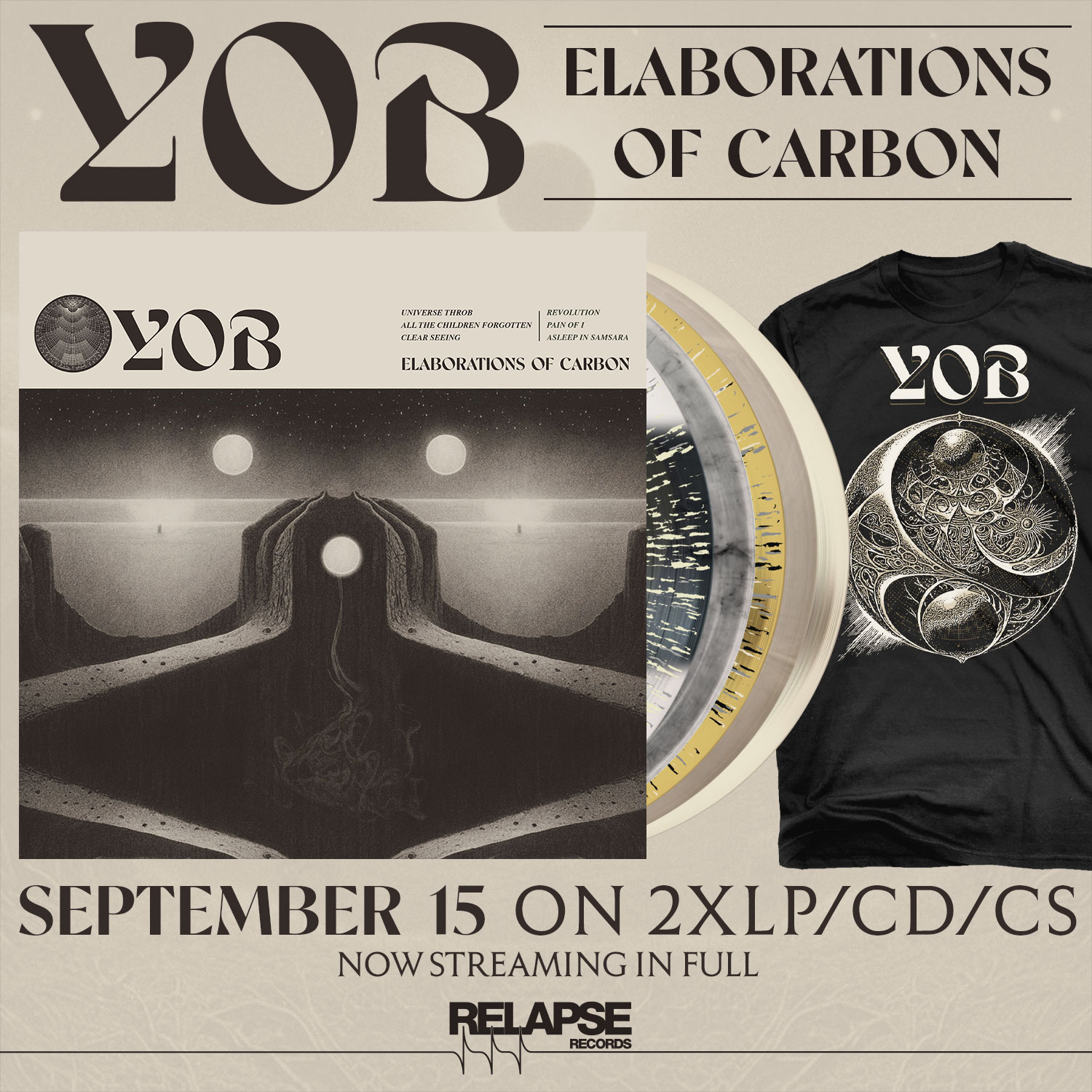


Catch Yob on tour this spring:
Sun 5/21 – Vancouver, BC – Modified Ghost Festival
Thu 5/25 – Seattle, WA – Northwest Terror Fest
Fri 5/26 – Boise, ID – Treefort Music Hall
Sat 5/27 – Salt Lake City, UT – Urban Lounge
Sun 5/28 – Denver, CO – Gothic Theater*
Tue 5/30 – St Paul, MN – Turf Club*
Wed 5/31 – Omaha, NE – Slowdown*
Thu 6/01 – Lawrence, KS – Bottleneck*
Fri 6/02 – Little Rock, AR – Mutants Of The Monster Fest*
Sat 6/03 – Murfreesboro, TN – Hop Springs*
Sun 6/04 – Louisville, KY – Portal*
Tue 6/06 – Chicago, IL – Thalia Hall*
Wed 6/07 – Pittsburgh, PA – Spirit Hall*
Thu 6/08 – Baltimore, MD – Ottobar*
Fri 6/09 – Philadelphia, PA – Underground Arts*
Sat 6/10 – Boston, MA – Middle East (downstairs)*
Mon 6/12 – New York, NY – Le Poisson Rouge*
Tue 6/13 – New York, NY – Le Poisson Rouge #
Wed 6/14 – Richmond, VA – The Broadberry #
Thu 6/15 – Asheville, NC – Asheville Music Hall #
Fri 6/16 – Atlanta, GA – Masquerade (Hell) #
Sat 6/17 – New Orleans, LA – House Of Blues #
Sun 6/18 – Austin, TX – Oblivion Access Festival #
Tue 6/20 – Albuquerque, NM – Sister #
Wed 6/21 – Mesa, AZ – The Nile #
Thu 6/22 – San Diego, CA – Brick By Brick #
Fri 6/23 – Los Angeles, CA – Teragram Ballroom #
Sat 6/24 – Oakland, CA – 3rd & Castro #
* = w/Cave In
# = w/Pallbearer

